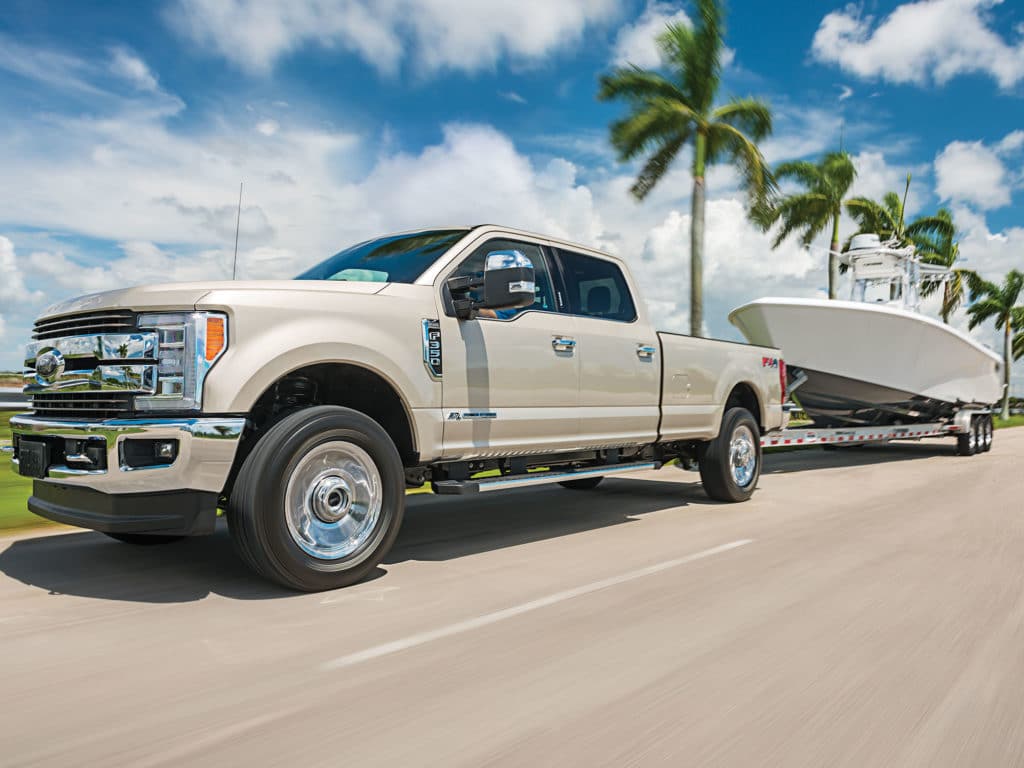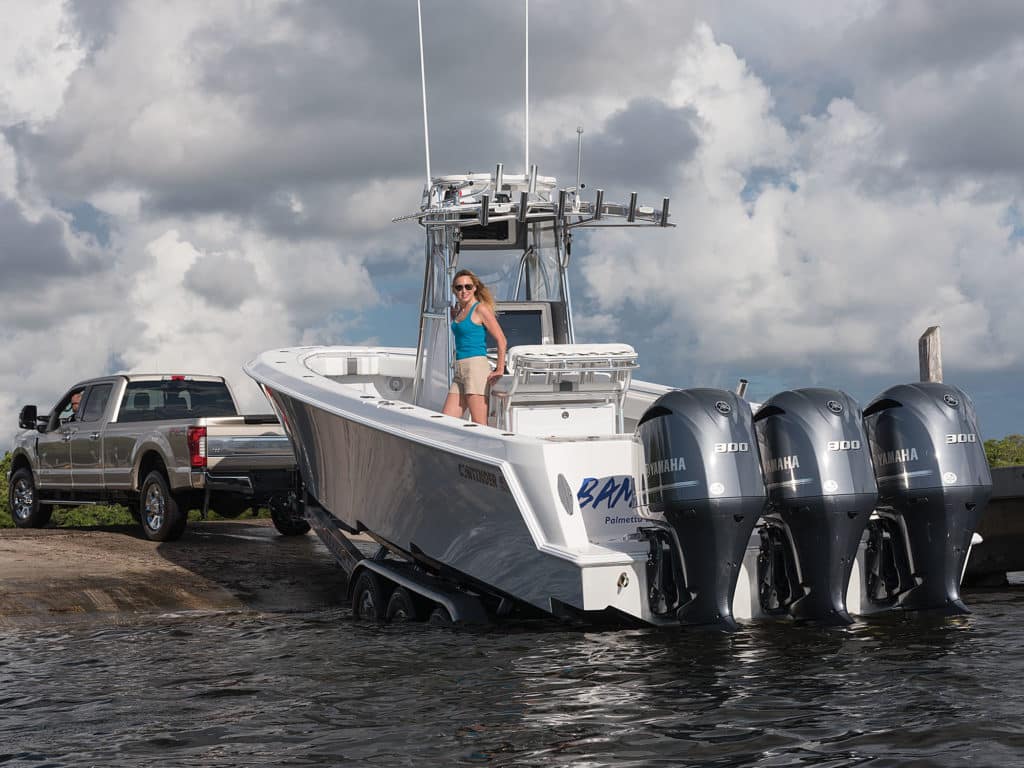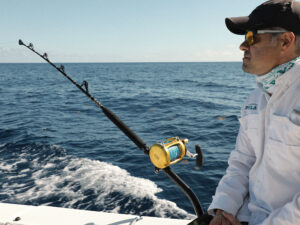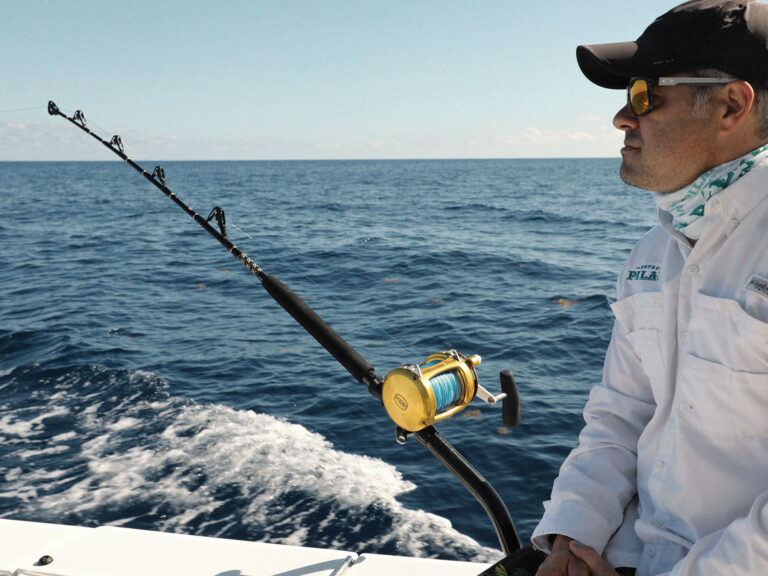
The size of trailerable fishing boats has been creeping upward for decades. Fortunately, tow vehicles have added towing capacity and a host of technological aids to make towing easier and safer. Here’s what information you need to hit the road safely, no matter what you have in tow.
Know Your Numbers
The most important rating to look for when shopping for a tow vehicle is its maximum towing capacity with a conventional ball hitch, as opposed to the larger fifth-wheel/gooseneck rating companies like to brag about in advertisements. Another significant number is the trailer’s Gross Vehicle Weight Rating (GVWR), the maximum allowable weight of the boat, motor, gear and fuel a trailer is authorized to carry. Although hauling the max weight is DOT-legal, a good rule of thumb is to not exceed 85 percent of each capacity to provide an extra margin of safety and peace of mind.
Tow Vehicle Capacities
Half-ton trucks are among the most popular tow vehicles because of their impressive capacities when properly equipped with optional engines and towing packages. These typically include beefier suspensions, oil coolers and enhancements, like a transmission with tow mode that increases capabilities. Some modern vehicles also offer lane assist and collision-preventing braking systems.
The Big Three automakers dominate the heavy-boat tow-vehicle category. The Ford F-150 can haul as much as 14,000 pounds, the Chevy Silverado 1500 does 13,400 pounds, and the Ram 1500 can do 12,750 pounds. All these have enough capability to tow a boat like Pursuit’s S 268 center-console (with a dry weight of 6,670 pounds), the trailer, a full fuel load and gear. Don’t forget to make sure the vehicle’s hitch is rated for the load you will be pulling.
Towing a Tank
You’ll need a more serious tow vehicle to pull a boat like a Yellowfin 36 Offshore, a model that’s popular with many road-warrior tournament anglers because it has a narrow-for-its-length 10-foot beam. This is a comfortable fit for skillful drivers on most highways that have 12-foot-wide lanes and isn’t subject to the more stringent regulations of a wider boat. It has a dry weight of 9,500 pounds and can be tanked up with 477 gallons of fuel (2,682 pounds). With a typical gear and fuel load, total weight is around 14,000 pounds. Add a 2,000-pound triple-axle trailer and the weight equals about 16,000 pounds.
To pull it safely, a good choice is a 1-ton pickup with dual rear wheels and a turbo diesel engine, such as the Ford F-350 Super Duty (with a boat towing capacity of 21,000 pounds), Ram 3500 (23,000 pounds) or Chevy Silverado 3500 (20,000 pounds).
Read Next: Long-Distance Boat Trailering

Find Your Rig’s True Capability
To calculate a tow vehicle’s real-world max towing capacity, take the Gross Combined Vehicle Weight (GCVW), which is the weight of the boat, trailer, gear, gas, passengers and tow vehicle, then subtract your truck’s curb weight, which is the total weight of an empty vehicle plus fluids like oil and gas. To obtain an accurate weight for your boat and trailer, head to a truck stop and use its CAT scales.
Staying Legal
There is a lot of misinformation floating on the web regarding wide-load restrictions, so it’s important to check your state’s regulations regarding trailer width, weight, length, permitting and display requirements. All states allow tow vehicles and trailers to be 8 feet, 6 inches wide (9 feet in Hawaii), but in 15 of those states (including the District of Columbia), the width limit is 8 feet on non designated roads (typically, roads 20 feet wide or less).
Towing big boats with today’s capable vehicles is easy, providing you do the math, drive smoothly, give yourself plenty of space behind the vehicle in front of you, and always remain situationally aware.
High-Tech Towing
Brake controllers used to be the pinnacle of trailer tech, but recent innovations have led to a host of improvements that increase your boat’s over-the-road performance. Ford F-150s from the middle of 2021 and newer come outfitted with the company’s Onboard Scales feature, which estimates the weight of cargo you’ve stowed in the bed using a series of sensors under the corners of the truck. They also come outfitted with Smart Hitch, which calculates the weight of whatever is attached to the rear of your truck, letting you know your boat’s exact tongue weight without a trip to the scales. This info is available via the truck’s touchscreen by illuminating progressive sections of the taillights, or via a smartphone app.









